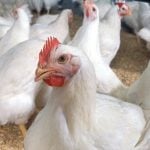Ontario’s crop producer groups and beekeepers say they plan to “work together” this spring to protect crop pollinators as federal officials review and tighten label warnings on a group of corn insecticides for their potential risks to bees.
Health Canada’s Pest Management Regulatory Agency (PMRA) last month announced a review of Canada’s approved neonicotinoid insecticides, which include clothianidin, thiamethoxam and imidacloprid, following over 230 separate reports of bee kills in Ontario and Quebec during last spring’s corn planting season.
Pending the review, the agency has proposed label amendments to a number of neonicotinoid products to take effect this year in time for the 2014 growing season, to “alert growers and applicators to the potential hazard treated seed dust can pose to bees and to provide information regarding best management practices to be employed during the planting of treated seed.”
Read Also

China seeks improved ties with Canada amid rising trade tensions
China called on Friday for steps to improve bilateral ties with Canada, saying there were no deep-seated conflicts of interest, following a spike in trade tensions with many of Beijing’s Western trade partners this year.
The products to which the amended labels would apply include Bayer CropScience’s clothianidin seed treatment Poncho, Valent Canada’s clothianidin treatment NipsIt Inside, Syngenta Canada’s thiamethoxam-based Cruiser seed treatments, Bayer’s imidacloprid-based Gaucho insecticides and Mana Canada’s imidacloprid product Sombrero 600.
Between April and June 2012, PMRA received an “unusually high number of incident reports” of bee losses from across southern Ontario, involving 40 beekeepers and over 200 beeyards, plus a report from Quebec involving eight beeyards.
“Timing and location of these incidents coincided with corn planting in major corn-producing regions of the provinces,” the agency said in a document last month on the review.
Specifically, Ontario’s grower and beekeeper groups said in a recent joint release that 230 separate incidents of bee kills were reported in that province, “predominantly in the southwest.”
The Ontario Beekeepers Association, Ontario Federation of Agriculture, Grain Farmers of Ontario and Christian Farmers Federation of Ontario said they are “working together to address the concerns of all our farmer-members in relation to this issue.”
The groups also “agree there is much more work to be done to clarify the relationship between neonicotinoid insecticides and the spring 2012 bee kills.”
The groups added it is “our goal to ensure farmers have access to all crop protection products as they deem necessary for a successful growing season” but also “recognize the important role honeybees play in pollinating crops and are dedicated to ensuring a healthy bee population in Ontario.”
Further, they said, they “are calling for an open dialogue between farmers, beekeepers, government agencies, the crop protection industry and equipment manufacturers.”
“Technical improvements”
Residues of nitro-guanidine neonicotinoids used in corn seed treatments were found in about 70 per cent of the dead bee samples analyzed, PMRA said last month. “On a beeyard basis, these residues were detected in approximately 80 per cent of the Ontario beeyards where dead bee samples were collected and analyzed (57 out of 70 yards), and in all Quebec beeyards where dead bee samples were collected (one yard).”
Information to date, PMRA said suggests “insecticides used on treated corn seeds contributed to many of the 2012 spring bee losses” by way of “dust containing insecticide residues that was generated during the planting of treated corn seed.”
A “full evaluation” of those incidents is being finalized and will be released once it’s complete, PMRA said.
Meanwhile, PMRA will set up a program starting this spring to “communicate best management practices for pollinator protection to growers and beekeepers, including the best practices for planting treated seed,” followed by “longer-term measures, currently under research and development, which will be implemented as soon as possible.”
The pesticide industry — including individual companies and their trade group, CropLife Canada — is to “report regularly to the PMRA on development of technical improvements designed to further reduce the release of dust from treated seed.”
Areas requiring “technical improvement and stewardship” include seed coating quality, seed flow lubricants used during planting, planting equipment, and disposal of treated seed bags. Pilot programs for disposal of treated seed bags are already being developed, PMRA noted.
All that said, PMRA warned, as its re-evaluation of nitro-guanidine neonicotinoids goes forward, “lack of progress in dust reduction may result in additional regulatory measures being taken.”
“Violations”
Groups in the U.S. aren’t waiting for a review, as four professional beekeepers and five environmental and consumer groups announced Thursday they will sue the U.S. Environmental Protection Agency in a District Court in California, demanding the EPA suspend the use of clothianidin and thiamethoxam.
According to a Reuters report Thursday, the groups claim to have records of several “legal violations” by EPA officials connected to approvals for clothianidin and thiamethoxam. The suit also challenges EPA’s use of “conditional registrations.”
Representatives from governments in the European Union have proposed a ban on neonicotinoids there, but failed to agree on a ban when they met March 15 on the matter, Reuters reported.
EU member states now have two months to reach a compromise or the European Commission could adopt the proposal, which would ban neonicotinoids on all crops — except winter cereals and plants not attractive to bees — effective July 1.
Related stories:
PMRA reviews insecticide link to bee deaths, March 21, 2013
Hort-crop chemicals clear cross-border approval, Feb. 19, 2013
EU Commission wants curbs on pesticides to protect bees, Jan. 31, 2013
















